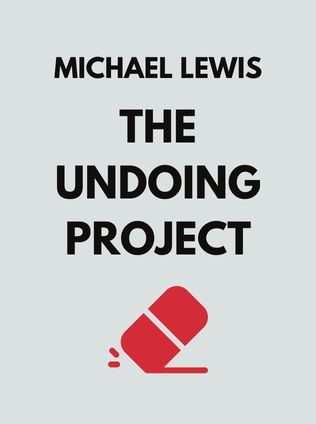
The Undoing Project
A Friendship That Changed Our Minds
By Michael Lewis
Published 12/2016
About the Author
Michael Lewis is a master storyteller who has made a career out of illuminating complex subjects through engaging narratives. Born in New Orleans in 1960, Lewis attended Princeton University, where he studied art history, and later earned a Master’s degree in economics from the London School of Economics. His career began in finance, working as a bond salesman at Salomon Brothers, an experience that inspired his first book, "Liar’s Poker." However, it was with "Moneyball" that he truly captured the public’s imagination, illustrating how data analytics could revolutionize sports management.
In "The Undoing Project," Lewis turns his keen eye to the field of psychology, exploring the lives and work of Daniel Kahneman and Amos Tversky. The book is not just a recounting of their discoveries but a deep dive into the intellectual partnership that redefined our understanding of decision-making, risk, and human behavior. Lewis's ability to connect the personal with the academic makes "The Undoing Project" a compelling read that bridges the gap between the scientific community and the general public.
Main Idea
At its core, "The Undoing Project" is a story about how two Israeli psychologists, Daniel Kahneman and Amos Tversky, transformed the way we understand the human mind. Their collaboration, which spanned decades, challenged the prevailing assumptions about human rationality and revealed the cognitive biases that influence our decisions. Through their work, Kahneman and Tversky developed several groundbreaking theories, including heuristics, prospect theory, and the concept of "undoing" or mental simulation. These ideas have not only reshaped psychology but have also had profound implications for fields such as economics, medicine, and public policy. Michael Lewis’s narrative weaves together the personal and professional lives of these two men, showing how their friendship and intellectual synergy led to discoveries that continue to impact our world today.
Table of Contents
- Daniel Kahneman: A Life Shaped by Adversity
- Amos Tversky: The Brilliance of a Maverick
- The Collaboration Begins: A Meeting of Minds
- The Birth of Heuristics: How We Think
- Decision-Making and Prospect Theory: Risk and Reward
- The Theory of Undoing: Coping with Regret
- The Legacy of Kahneman and Tversky: Beyond Psychology
Daniel Kahneman: A Life Shaped by Adversity
Daniel Kahneman’s early life was marked by adversity and survival, experiences that profoundly influenced his intellectual journey. Born in 1934 in Tel Aviv, Kahneman spent his childhood in Paris, France. His family’s experience as Jews during the Nazi occupation forced him into hiding and shaped his view of the world. The trauma of these years left a lasting impression on him, cultivating an intense curiosity about human behavior, particularly the ways in which people deceive themselves in their thinking.
After World War II, Kahneman moved to Israel, where he pursued an education in psychology at Hebrew University. His interest in human error and judgment, which would later define his career, was evident early on. At Hebrew University, Kahneman was drawn to Gestalt psychology, a school of thought that emphasizes that the human mind interprets sensory information as a whole, rather than as a sum of parts. This was in contrast to the behaviorist approach, which dominated psychology at the time, focusing solely on observable behaviors rather than internal mental processes.
Kahneman’s early work was marked by a skepticism of human judgment. This skepticism was born from his role in the Israeli army, where he was tasked with evaluating new recruits. He noticed that evaluators often made errors in judgment based on first impressions, a phenomenon he identified as the "halo effect." To counteract this, Kahneman developed a scoring system that relied on observable behaviors rather than subjective opinions, significantly improving the accuracy of evaluations. This experience reinforced his belief that structured, data-driven approaches could mitigate the flaws inherent in human judgment.
Amos Tversky: The Brilliance of a Maverick
Amos Tversky, born in Haifa in 1937, was the quintessential maverick. Unlike Kahneman, Tversky was outgoing, confident, and possessed an unshakeable belief in his intellectual abilities. His early life was marked by a love of adventure and a natural inclination towards mathematics and philosophy. Tversky’s academic career began at Hebrew University, where he initially focused on psychology but soon became disillusioned with what he saw as the field’s lack of scientific rigor.
Tversky was particularly interested in decision-making processes and how context influenced the choices people made. He challenged the prevailing economic theories that assumed human beings were rational actors. His work demonstrated that preferences were often intransitive, meaning that a person’s choice between two options could change based on how those options were presented. This insight laid the groundwork for his later work with Kahneman, where they would explore these inconsistencies in human judgment in greater depth.
Tversky’s fearless approach to questioning established norms set him apart in the academic world. His ability to see problems from novel angles and his rigorous analytical skills made him a formidable figure in psychology. These qualities would prove invaluable when he began his collaboration with Kahneman, a partnership that would revolutionize the field.
Sign up for FREE and get access to 1,400+ books summaries.
You May Also Like
The Subtle Art of Not Giving a F*ck
A Counterintuitive Approach to Living a Good Life
By Mark MansonRich Dad Poor Dad
What the Rich Teach Their Kids About Money - That the Poor and Middle Class Do Not!
By Robert T. KiyosakiHow To Win Friends and Influence People
The All-Time Classic Manual Of People Skills
By Dale CarnegieFreakonomics
A Rogue Economist Explores the Hidden Side of Everything
By Steven D. Levitt and Stephen J. DubnerQuiet: The Power of Introverts
The Power of Introverts in a World That Can't Stop Talking
By Susan Cain



















